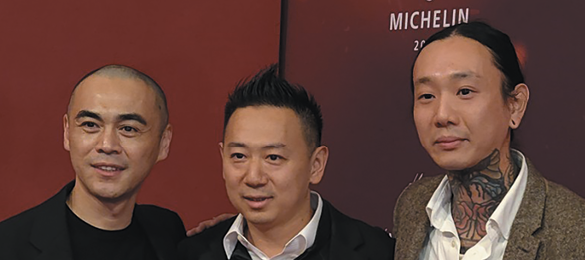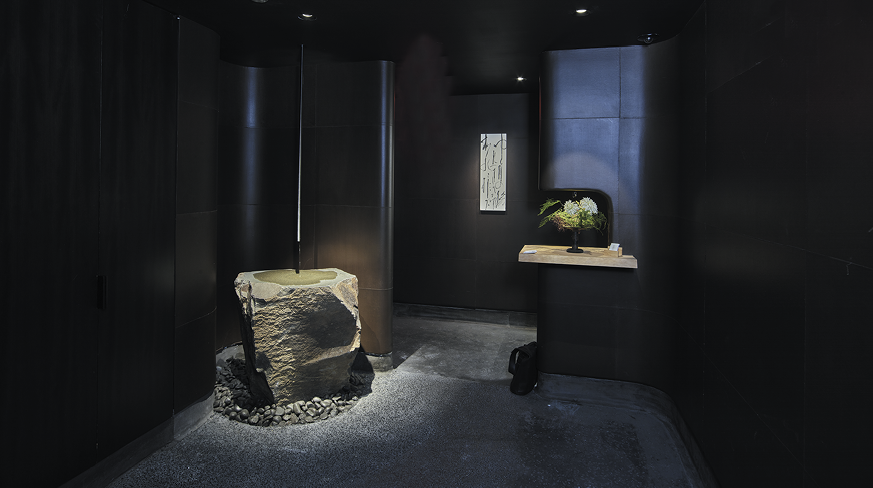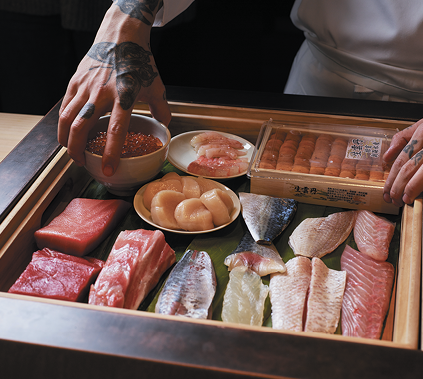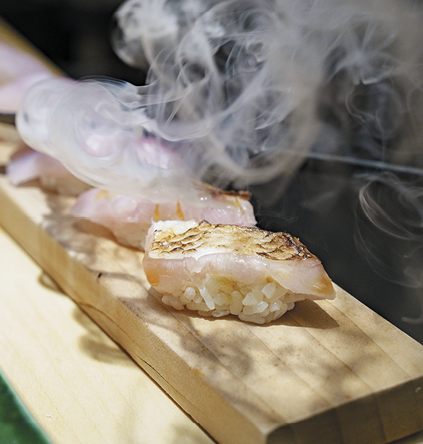- Home
- Media Kit
- MediaJet
- Current Issue
- Past Issues
- Ad Specs-Submission
- Reprints (PDF)
- Photo Specifications (PDF)
- Contact Us
- PRIVACY POLICY
- TERMS OF USE
![]()
ONLINE
![]()
ONLINE


Xiao Lin, George Ruan, Wayne Cheng
The Jōji Experience
Editors’ Note
George Ruan’s innate appreciation for fish and love of food would become a foundation for his rise as a sushi chef. In 2004, Ruan took on an opportunity to work for world-renowned Chef Masa, initially hired as a server. Recognized for his dedication and work ethic, he was soon training in the kitchen and at the grill station. When his potential as a sushi chef was revealed, he spent nearly two decades honing his craft at Masa. This incredible opportunity to train in both front and back of the house in three Michelin starred Masa developed his keen understanding of Japanese cuisine and commitment to fine dining. Ruan introduces his namesake, Jōji, as an homage, a celebration and an interpretation of the cherished omakase experience.
Born in Fuzhou, China, Xiao Lin, whose mother was a chef, moved to Japan for two years when he was 21 to study the Japanese language at school and then college. After that, he came to America where he worked intensively to immerse himself in the subtleties of Japanese cuisine. Passionately dedicated to cooking a wide range of styles, he quickly graduated to work in a Michelin-starred Kaiseki restaurant, Brushstroke, before moving to the highly acclaimed Bar Masa and Masa. His most recent position before joining the Jōji team was Head Chef at Sushi Azabu. Lin’s love of food and the thrilling pursuit of collaborating with a team inside the kitchen of a great restaurant is the culmination of 20 years of passionate involvement in the culinary world.
Born and raised in Hong Kong, Wayne Cheng’s culinary journey began at the age of 17, inspired by his upbringing surrounded by the Uni farms of his father and the Cantonese cuisine of his grandfather. Since moving to New York City in 2009 to work at three-Michelin-starred restaurants Masa and Eleven Madison Park, he has continued to evolve his cuisine, inspired by his Cantonese, Japanese, and European culinary training background. After successfully developing the kitchen menu at New York City’s hottest new cocktail bar, Martiny’s, Cheng was eager for this next chapter: bringing his fresh perspective and unique culinary style to sushi omakase at Jōji.
Restaurant Brief
At Jōji (jojiny.com), a chef and sommelier share the culinary stage to create a dining experience unlike any other. Nestled within a serene refuge in the heart of Midtown’s iconic One Vanderbilt, the intimate dining room is infused with authentic Japanese character, designed with a deep reverence of nature to create a refined and serene dining experience that both inspires and delights. The traditional multi-course omakase experience is uniquely designed for each guest using only the finest seasonally available ingredients, paired with premium sake and fine wine. With dining operations overseen by Michelin-Starred Chef Daniel Boulud, Jōji delivers a sophisticated, elegant culinary journey for every guest. Jōji has been awarded a prestigious Michelin star.

Jōji restaurant’s rock garden
Will you discuss your career journeys as chefs?
Ruan: My father was always in the food industry, but I studied accounting when I went to college. I was working part-time as a server and it just happened that I stayed in the industry. I do not think I would be as happy in another career – I love being a chef. It was about being in the right place at the right time.
Cheng: I started at a young age, around 17, and knew what I wanted to do. I enjoyed cooking since I was a child – it came from my parents who loved to cook.
Lin: When I was 10 years old, my mother had a small restaurant in China, and I helped her at times. I really enjoyed the food from the chef, and while at the time I did not know that I would become a chef myself, I think this is where my interest in cooking started.
How did the opportunity to create develop?
Ruan: When COVID happened, the restaurant industry was devastated, and we were out of jobs. I was doing a lot of catering at people’s homes since the restaurants were closed and people didn’t want to go out. I brought together people I knew to help with catering and to work with me on private events. One of our biggest supporters was Michael Rodriguez, and with his relationships with the real estate industry, Michael helped introduce us to Marc Holliday and SL Green which made this happen. Marc is a visionary and it has been amazing to be a part of One Vanderbilt and to have such engaged and supportive owners of Jōji.
What was it like for the three of you to go out on your own to run the restaurant?
Cheng: We did not have a plan to run our own restaurant, but the timing was right – when you have the right timing, the right team, and the right partners – you can create something amazing.
Lin: We have known each other for more than a decade, so we know how each of us works and what we do well. It was a great opportunity to take our talents and bring them together to build Jōji.
How do you describe the Jōji experience and what makes Jōji different?
Ruan: We are focused on the guest experience and making sure our guests have a great time. Jōji is not stuffy – it is a welcoming environment where you enjoy omakase while talking to the chef and meeting new people sitting around you. Jōji is a place where you can make friends while having a special dining experience.

Jōji seasonal selection of sushi
Will you highlight the private dining room at Jōji?
Ruan: The private dining room at Jōji is unique. You will have a private chef working with you the entire time – it is an opportunity to have your own private party with an omakase chef. I do not think there is any other omakase restaurant that offers what we are doing at Jōji – you are even able to play your own music.
Jōji has many repeat guests. How important is it to continue to innovate and adapt the offerings?
Cheng: We change the menu for the regular guests so that each time they come, they will have a different food experience. We focus on understanding their palate so that we are able to cater to their food preferences. Our priority is the guest experience, and we want to build relationships with our guests and understand their wants and needs. This is what defines a true fine dining experience – it is about great food, great wine, great service, and making connections.
Lin: We see our guests as friends, and we have built many great relationships with our guests which has made Jōji special.
How critical has it been to build the Jōji team?
Ruan: We all worked at Masa, and there is no better place to learn and train as you grow your career. Masa teaches you to focus on every detail – even the smallest details. The attention to detail that Chef Masa wanted every single night it is hard to explain. That experience was so valuable in teaching us what is takes to create a special restaurant, and there is nothing more important than building a great team. You need to have a team that shares the same philosophy and same goals.
Cheng: We look for people who have a positive vibe since it takes more than the three of us to make this work – it is about the entire team that is working together to create the Jōji experience. We have taken our Masa experience and developed something different – Jōji is more casual and a different type of service, while still being committed to the highest standards.
Lin: It helps that many of the people on our team have worked together in the past, so we know each other and trust each other.

Jōji seared akamutsu fish
Will you highlight Jōji’s takeout offering, Jōji Box?
Ruan: Jōji is located in the heart of Manhattan in One Vanderbilt at 42nd Street and Grand Central Station. This is the mecca of New York City. We wanted to create an opportunity for people who may not have been able to dine at Jōji to still experience the quality of the food. Jōji is a ten-seat restaurant, so not everyone is able to join us here, but the Jōji box is a great way to experience Jōji. We believe it is the best quality to-go offering in New York City with the freshest fish selection available.
Lin: We see strong opportunities to work with leading companies in Midtown Manhattan to fulfill the needs of their executives and employees with a high-quality, fresh, and heathy to-go offering.
Jōji recently received a Michelin Star. What did this recognition mean to you?
Cheng: Receiving a Michelin Star means that we need to continue to move forward and continue to raise the bar. It meant a lot to our entire team to be recognized for our hard work, but our focus is on continuous improvement.
Lin: It means a lot to the three of us as chefs, and to our whole team. It is always special to be recognized for your work, and it makes us want to get even better in the future. Our main focus is on hospitality, and on the guest experience.
Ruan: The recognition has been amazing. This is not the endpoint – we are shooting for more than one star. Having said that, our main focus is to make the people who come to Jōji, the people who helped us create Jōji, and the people who have supported Jōji from the beginning, be happy and proud.
How do you define the keys to a true fine dining experience?
Cheng: It starts when the guest takes their first step into the restaurant – the smell, the touch, the music, the energy. It is about the entire experience, from the service and food to the environment and vibe.
Will you elaborate on the importance of having owners who are so engaged and committed to ?
Ruan: This is the most important part of making Jōji successful. Whether it is Marc Holliday or Michael Rodriguez – those are the people who really made this happen. They have been supportive since the beginning and are always willing to do whatever it takes to make Jōji better. They are true partners, and we are fortunate to be able to rely on their support and expertise.
What has made the relationship between the three of you work so well?
Ruan: We come from different backgrounds with different experiences, but it all comes together since we have the same beliefs about service and quality. We each have experience with different cuisines, and bringing this knowledge together has been very effective.
Cheng: We are not just partners in the business – we are friends. We respect each other and trust each other.
Lin: We enjoy working together, and we are all committed to making Jōji the best restaurant possible. It is great to work with people you admire and who you enjoy being around.
What advice do you offer to young people interested in pursuing a career as a chef?
Ruan: It has to be your passion. If you don’t love what you do, then it is a job. You need to enjoy being with people – whether it is the people you are serving or the people you work with. It is like a show where everyone is watching what you are doing, so you need to do it right.
Lin: It takes hard work and commitment, but it is worth it since you have the opportunity to provide people with special experiences and be a part of their special moments in life.
Cheng: Like George said, it is like a show, and once the doors open, the lights are on. You need to be on the top of your game every night since it is about providing each and every guest with a memorable experience.![]()